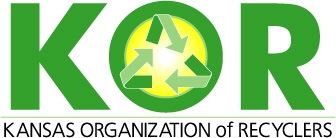- Home
- Recycling
RECYCLING GENERAL INFORMATION
Recycling is a process that allows us to reuse material, again and again. It involves separating, collecting, processing, marketing, purchasing and using a material that otherwise would have been dumped in a landfill. Right now, about 33% of Municipal Solid Waste generated in Kansas is recycled.
Shop Smart. Get on the recycle cycle!
Buy goods produced with recyclable materials. Don’t buy products that include unnecessary packaging.
-
Buy products that come in recyclable or small packaging.
-
Take used motor oil to a service station for recycling.
-
Buy in bulk. There’s less packaging and you save money.
-
Think durable rather than disposable.
-
Buy rechargeable batteries.
-
Carry your own shopping bags or choose paper over plastic.
Businesses throughout Kansas can be a special part of the recycling effort by developing purchasing policies that encourage the selection of products made from recycled materials.
Did you know park benches could be produced from recycled plastic milk jugs?
That’s not all. Insulation can be made from old newspapers; bald tires can become a patio surface or a welcome mat; and the polyester resin from a plastic pop bottle can be turned into everything from carpet to clothes.
Whether you’re shopping in Oberlin or Olathe, Topeka or Tonganoxie, your local grocery store isn’t just a convenient place to buy food. It’s one of the best places for you to send a message to manufacturers about the importance of recycling.
When you’re in the produce section, don’t buy tomatoes in cellophane. Buy the individual tomatoes instead. When you’re in the detergent aisle, select a cleanser in a refillable bottle. And when you get to the checkout stand, have your reusable cloth sack ready or ask for paper, don't use plastic.
Does it really matter?
You bet. The actions you take every day to reduce, reuse and recycle make all the difference. And these are actions everyone can take at home, at work, even at the grocery store.
What should you look for?
There are two kinds of recycled content: post-consumer and pre-consumer. Post-consumer means the material was used by someone like you and recycled. Pre-consumer means the manufacturer reused material that would otherwise be wasted during the production process. The higher the percentage of post consumer waste a product contains, the better.
A plastic container featuring a code number inside the symbol is just identifying the type of plastic resin the container is made from. It doesn’t mean the product is made from recycled material or that it can be easily recycled in your community. Look for goods that indicate the product or package is made in part from recycled materials.
The Big Picture.
According to the United States Environmental Protection Agency, “Each year, our nation generates enough garbage to fill a convoy of trash trucks reaching halfway to the moon. And the convoy keeps growing longer every year!”
It’s not just the trash inside!
A big part of municipal solid waste is composed of material you can easily recycle at home – yard waste. There are two simple solutions. First, take the bagger off the mower and use grass clippings as mulch for your yard. Second, you can compost grass, leaves, flowers, twigs and non-spreading weeds in a compost bin. Your efforts will improve the Kansas environment – and your yard will look great! Remember it is not recycled until you reuse it or buy recycled products.
Make less waste.
How many bags of trash did you haul out to the curb this week? How many bags have you filled this year? The grand total might surprise you. Every year, every Kansan produces an average of more than 3/4 of a ton of trash.
Trash generated in homes, commercial establishments, schools and other institutions is also known as Municipal Solid Waste, or MSW. It consists largely of paper, plastic, metal, food scraps and yard wastes.
Recycling begins and ends with you.
You can make a decision to separate recyclable materials from other trash at your home and office. You can make sure those materials are collected for processing. As a final step, you can purchase goods made from recycled materials; a consumer action that provides vital support for the recycle cycle.
